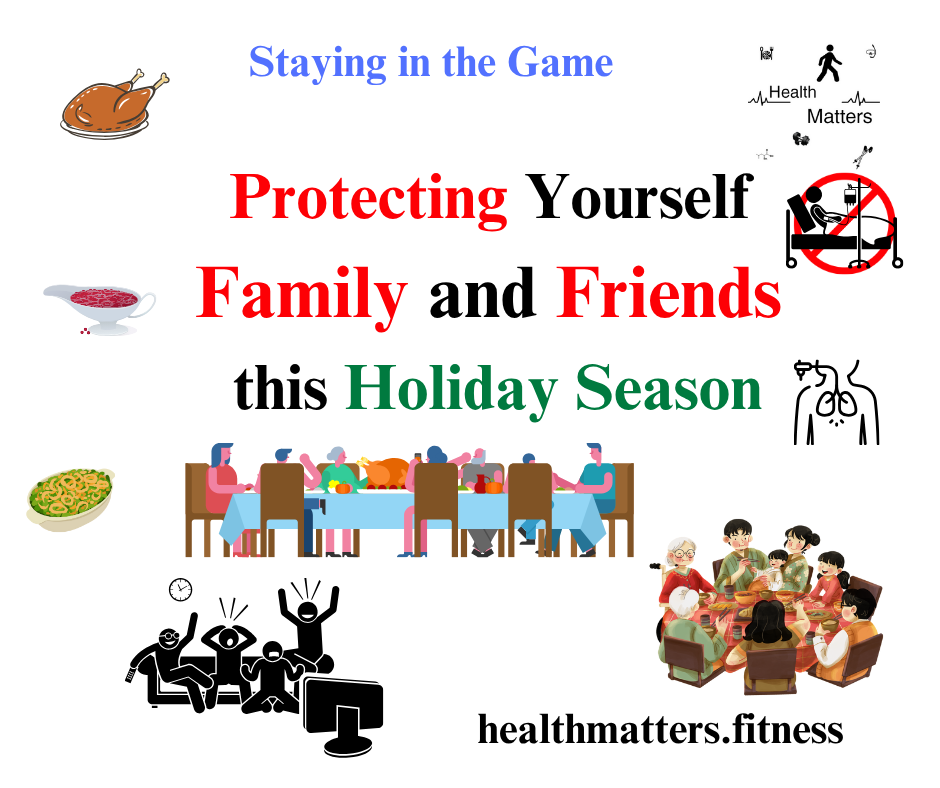
November is here and that means the holiday season is just around the corner. This is a great time for all of us to get together with our family and friends. Unfortunately, these gatherings are also a great opportunity for respiratory bugs to spread to the young and the old.
For many of us, a respiratory infection may just mean a few days of being out of work and feeling crappy. However, for some people being infected with a bug such as the virus that causes COVID-19 or the influenza virus can mean being hospitalized, suffering from long term complications, or even worse. While my personal risk of being hospitalized or dying from influenza or COVID-19 is low (but not zero), I have taken action to reduce my risk even lower AND my risk of passing one of the viruses on to someone who is at higher risk of severe disease.
The day after Thanksgiving, I will be spending hours in front of a TV watching the football game with older relatives who are at high risk of ending up in the hospital with COVID-19 or influenza. Christmas dinner could be a problem for my 83-year-old mother if I give her COVID-19.
It is not just the older relatives I am concerned about but the young as well. Young children are at significant risk from suffering from influenza and COVID-19 as many have never had either the illness or a vaccination against these viruses. While not common, far too many young children end up in the hospital or worse with influenza or COVID-19.
Being vaccinated will not give me 100% protection against getting infected. I know that vaccines do not provide 100% protection against the transmission of these viruses. But there is ample evidence that getting vaccinated lowers my risk of both getting infected and passing on the viruses – and it makes sense.
The American Academy of Family Physicians recommends for the 2025-2026 season that “all adults 19 years and older should receive a COVID-19 vaccine” (as well as an influenza vaccine). The organization recommends a onetime RSV vaccination for people over the age of 75 or over 50 who are at risk for severe R SV disease.
For children’s vaccination recommendations, the American Academy of Pediatrics (AAP) is a well-respected source and has updated its guidance for this season. The AAP advises that all children aged 6 months and older receive the influenza vaccine.
The American Academy of Pediatrics recommends all infants and children between 6 and 23 months receive the 2025-2026 COVID-19 vaccination. The AAP states all other children at higher risk of developing severe COVID-19 “should” receive the updated COVID-19 vaccine. The guidelines also state that any other children whose parents want them to be vaccinated be offered the current vaccine. Having a chronic health condition such as diabetes or being overweight places a child at higher risk of having severe COVID-19. However, a large percentage of kids who have been hospitalized with COVID-19 did not have a predisposing condition and far too many otherwise healthy children have died of COVID-19.
Our newest set of tools to protect children from hospitalizations and death are the vaccines against RSV. The respiratory syncytial virus (RSV) infects almost all children and results in the hospitalizations and deaths of far too many. We now can give infants and young children “passive vaccination” by giving them antibodies before entering the RSV season. Talk with your child’s primary care provider to see if your child is eligible for this preventive treatment.
Mothers can protect their newborns from infections by getting vaccinated during pregnancy and passing on the antibodies to the baby they are carrying. You should check with your provider of obstetric care for details.
While respiratory infections are nearly impossible to avoid, we can take steps to minimize their impact on our health and reduce the disruptions they cause in our lives and the health and wellbeing of those around us.
Being in overall good health through getting a good night’s sleep, choosing nutritious foods and getting regular physical activity is a start but not the end of what you can do to avoid getting really sick, and passing on respiratory infections. We can give our bodies a head start against the most problematic invaders by showing our body what it will be challenged with. We can “load the dice” when it comes to what will happen when we breathe in certain viruses and bacteria. We improve our odds by training our immune systems through getting vaccinated.
You can get vaccinated at most pharmacies and medical clinics.
I wish you a great holiday season with your family and friends.
Russ
Taking Care of Yourself – Upper Respiratory Infections
Preventing Spread of Respiratory Infections When You are Sick
Adult Respiratory Immunization Recommendations 2025 – 2026
Respiratory Virus Immunization Recommendations – Children 2025 – 2026
Coughs and Colds: Medicines or Home Remedies? (American Academy of Pediatrics)
Should I get tested when I have a cough, runny nose or sore throat?
Health and Medical Resources: Infectious Diseases and Public Health
Some additional resources you might find interesting and helpful: